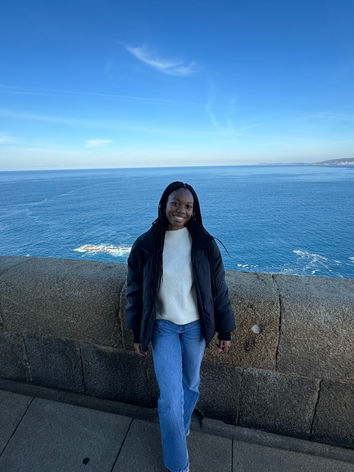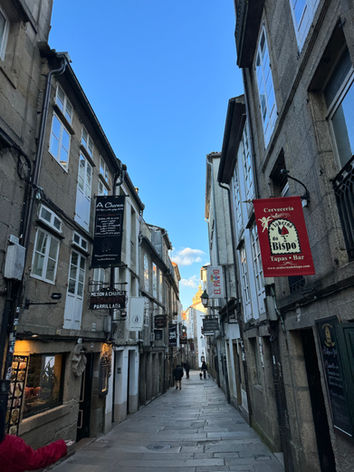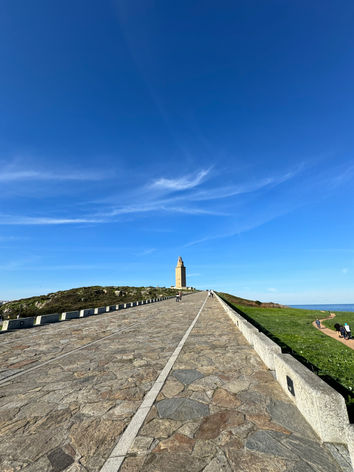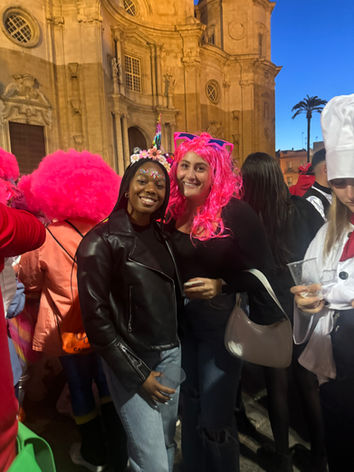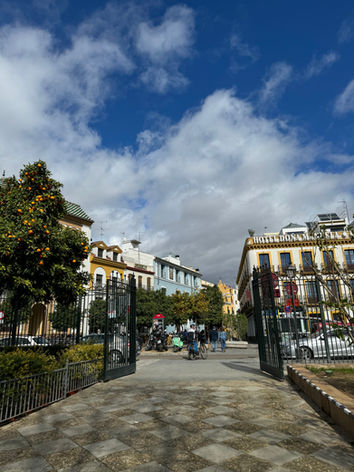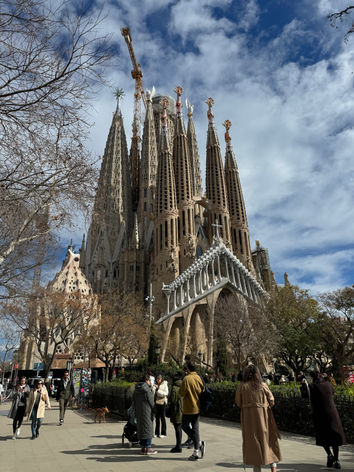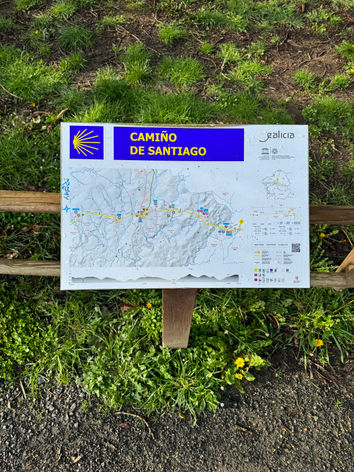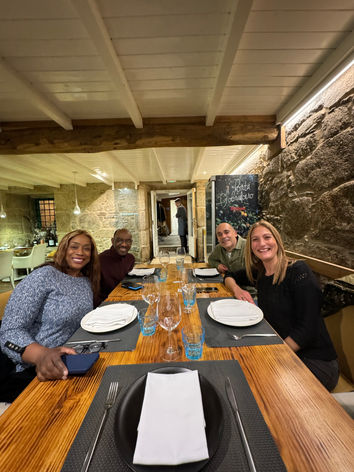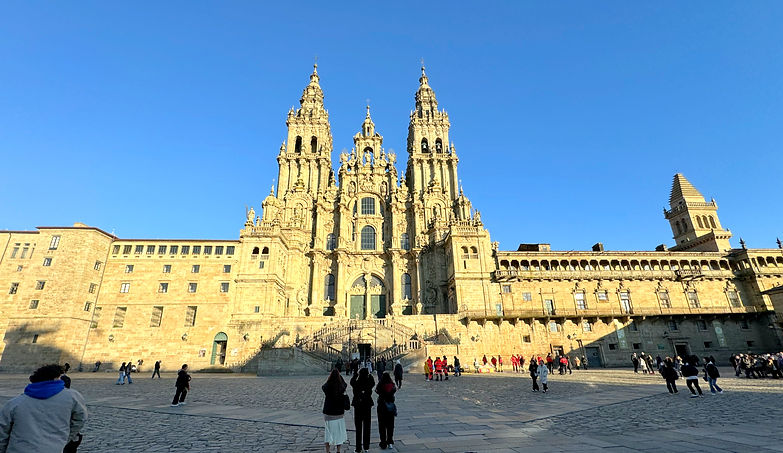
STUDY ABROAD
SANTIAGO DE COMPOSTELA, GALICIA, SPAIN
Below you will find a reflection essay documenting my experience studying abroad and the cultural differences I discovered in Santiago de Compostela, Spain as well as pictures to document my time abroad.
MY TIME IN SANTIAGO DE COMPOSTELA
Studying abroad in Santiago de Compostela, Spain, during the spring semester of my junior year was a transformative experience that significantly shaped my academic and personal growth. As a double major in Spanish and genetics, I had never taken a semester without a science class, and my course load typically consisted of only one or two Spanish classes per term. However, my semester abroad was entirely focused on Spanish, with all courses conducted in the language. This immersion pushed me beyond my comfort zone, reinforcing my language skills and deepening my understanding of Spanish culture and history.
My passion for Spanish and language learning has been a part of my life since childhood. Although my parents only speak English, they instilled in me and my siblings a deep appreciation for languages. Both of my sisters majored in Spanish and studied abroad, which further inspired me to pursue this path. Santiago de Compostela had been a familiar name since middle school, as one of my sisters spent a summer there during high school. This familial connection to the city made my decision to study there even more meaningful and reassuring.
During my time in Santiago, I lived with an incredible host family who welcomed me with open arms. My host parents not only provided a warm and supportive environment but also encouraged me to engage fully with the local culture. One of the most unique aspects of my experience was the exposure to Galician, the co-official language of Galicia. While improving my Spanish, I also learned Galician, adding another dimension to my linguistic and cultural education.
Academically, I attended the University of Santiago de Compostela through its international college, where I took classes alongside other foreign students. Our professors specialized in teaching Spanish to non-native speakers, creating an engaging and supportive learning environment. Beyond the classroom, cultural immersion activities were a key part of the experience. These activities ranged from traditional music and dance workshops to excursions exploring the historical and architectural wonders of the region. Every event provided a deeper appreciation of Spain’s rich heritage and diverse traditions.
The overall picture of Spanish culture is deeply rooted in history, tradition, and strong communal ties. One of the most noticeable aspects of Spanish culture is the importance of social interaction and family connections. Unlike in the U.S., where individualism often takes precedence, Spanish society places a high value on collectivism and strong interpersonal relationships. Whether through long, leisurely meals or daily social gatherings in public squares, the Spanish lifestyle revolves around deep connections with others.
One significant cultural aspect I experienced in depth was the Spanish dining tradition. Meals in Spain are seen as social events, with lunch often being the largest meal of the day, followed by a mid-afternoon siesta. Compared to the fast-paced, on-the-go eating habits in the U.S., Spaniards take their time to enjoy food and conversation. Tapas culture, where small plates are shared among friends, exemplifies this communal approach to dining. Sitting down for meals with my host family and friends allowed me to see firsthand how food fosters relationships in Spanish culture.
Another important cultural practice I engaged with was the tradition of pilgrimage. Santiago de Compostela is famous for the Camino de Santiago, a historic pilgrimage route that attracts people from all over the world. Walking parts of the Camino and witnessing the devotion of the pilgrims highlighted the deep spiritual and historical significance of the tradition. While religious pilgrimages are not as common in American culture, the sense of purpose and community among the pilgrims resonated with me and provided a unique perspective on cultural and spiritual journeys.
One of the most rewarding aspects of my study abroad experience was volunteering at a local hospital. I spent time with inpatient children, engaging them in fun activities and offering companionship during their stay. This opportunity allowed me to give back to the community while practicing my Spanish in a meaningful and impactful way. It also reinforced my interest in science and healthcare. As a pre-med student who is pursuing a career in medicine, this experience bridged my two academic disciplines in an unexpected but fulfilling manner.
In addition to exploring Spain, my group and I traveled across Europe, experiencing the cultures of various countries. I was able to visit Portugal, England, Italy, France, Monaco, Hungary, and Austria. Each destination offered new perspectives, expanding my understanding of global diversity and interconnectedness. I was also able to travel around Spain to see other cities like Barcelona, Vigo, Madrid, Cadiz, Seville, and more. From historical landmarks to everyday interactions with locals, every moment contributed to my personal growth and intercultural awareness. Especially taking part in cultural events like football games, carnival, and more.
Reflecting on this experience, learning the Spanish language and culture has profoundly shaped how I think about myself and my relationship with society. Before studying abroad, I primarily saw language as a tool for communication. Now, I understand that language is deeply tied to identity, history, and social values. The emphasis on communal living and interpersonal relationships in Spanish culture made me reconsider the fast-paced, individualistic nature of American life. I have come to appreciate the importance of slowing down, fostering meaningful connections, and embracing cultural differences. Studying abroad has not only improved my Spanish skills but has also given me a new perspective on life, shaping the way I engage with people and cultures beyond my own. The friendships I formed, the lessons I learned, and the memories I created will stay with me forever, influencing my approach to language, education, and global citizenship.

